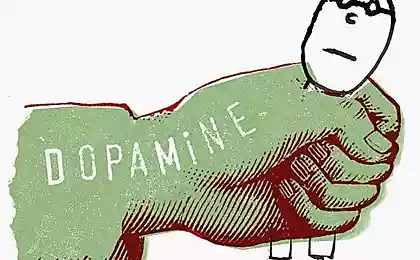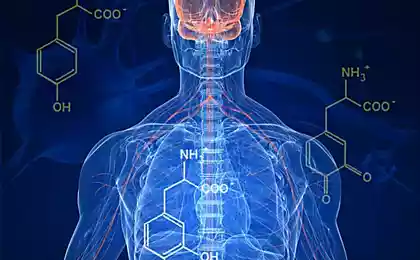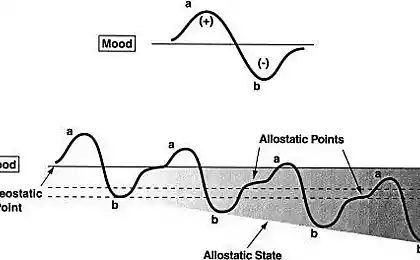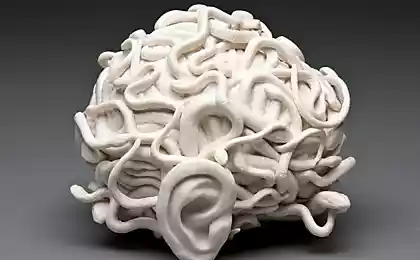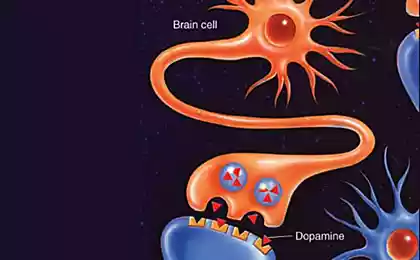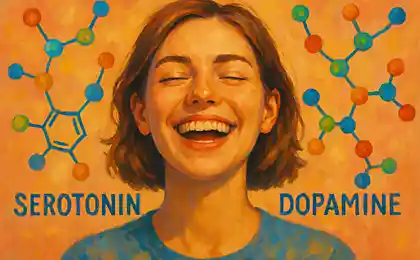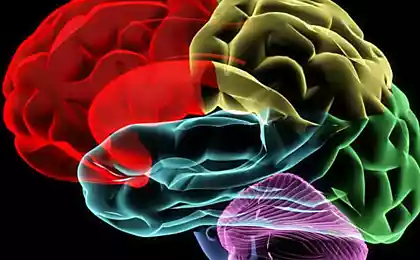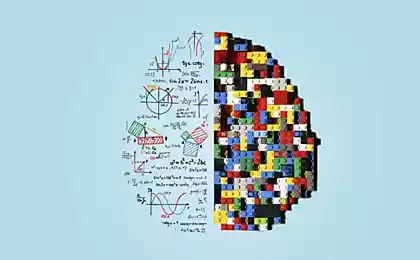1111
Leptin and dopamine: psychology energy status
Nutritional status modulates many forms of conduct associated with the search rewards. With a significant violation of the action of leptin increases craving for drugs and certain foods. The effect of leptin is closely associated with the mesolimbic region. Leptin reduces the severity of awards relating to both food and a variety of drugs, and this contributes to the complex range of changes in the mesolimbic dopamine neurons.
Currently, the connection between food (energy status and reward) is not in doubt. Deficient energy status (deficit) definitely enhances the craving for drugs and dependent behavior, overeating. At the same time, the deficit regime gives people less dependence on psychoactive substances.
If your body is in a deficit, you surely know its main manifestation: the sense of constant chronic fatigue and lack of strength. All your tests are normal, but you feel like dying. Yes, it is a mode of scarcity.
In the mode of deficiency occurs one important thing: you are dumb. Yes, you really are dumb, but this is, unfortunately, very difficult to notice yourself. Most often, on the contrary you will feel that you are smarter. In the first place under the regime of the deficit off the most energy-intensive organs: muscle, reproductive and immune system. And prefrontal cortex, which is responsible for your personality. Control passes to subcortical centers and the body begins to act very cost effective: simplifies everything and thinks contrasts. Or friend or foe. To drink or not to drink. There are no nuances and details. Yes it is easier, but adapting your suffering.
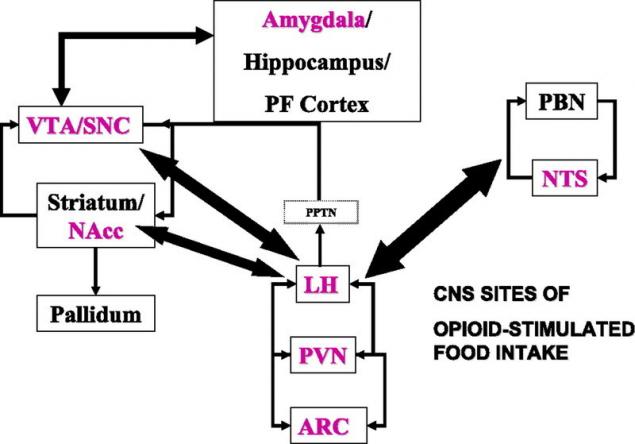
With a lack of leptin decreases the activity of dopaminergic neurons, plus increases the level of prolactin (risk of hypertension). It is established that satinovye signals from the lateral hypothalamic area (LHA) fall straight to the dopamine system ventral tegmental area (VTA). Introduction of leptin into this area suppresses appetite and causes weight loss.
Thus, latinova alarm system has a direct impact on the level of dopamine in the brain. Scientifically established that direct stimulation of hypothalamic leptin causes an increase of dopamine levels by 40% and increases the activity of gene transcription of dopamine to 2.5 times! The incredible rise!
Thus, leptin not only controls our eating behavior, but also a large part of the dopamine system that perfectly fits our theory of the deficiency and excess. Our diet greatly affects our emotional status and motivation. It is not the weight, it's in the normal work of the whole of our psyche, sense samodostatochnost and happiness in General! During normal operation, leptin much easier for us to resist all temptations, from food to dependencies of any kind.
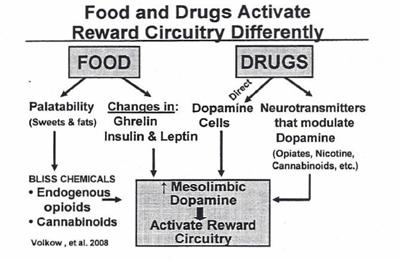
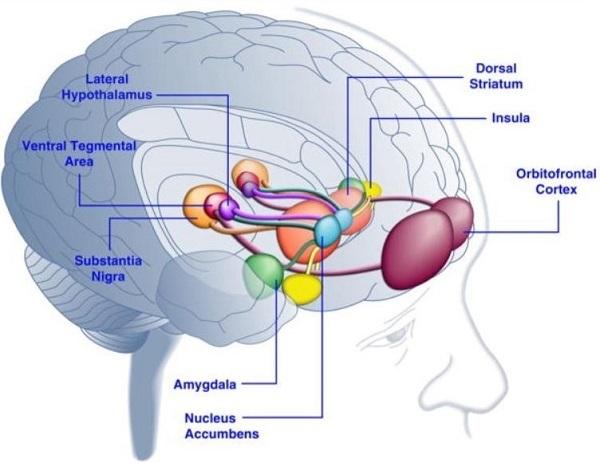
Some aspects of the action of dopamine in the framework of the "energy status". 1. Our mood.
The level of mood associated with the level of leptin. The reason for the above relationships is the ability of leptin to inhibit depressive behavior by stimulating the secretion of brain-derived neurotrophic factor in the hippocampus, as well as to provide anxioliticeski effect by inhibition of dopaminergic neurons of the mid brain structures. Recall that dopamine is neiromediatorom in determining our drive, desire and motivation to do anything. It is also responsible for memory, attention, and our energy level. Dopamine largely determines our mood. In the mode of deficit, we strive to simply "survive". This means that we do not act actively, but simply reduce the level of discomfort and stress. Such a model is called a "reduction drive", it is typical for subcortical level of "animal". This model considers that the acts of motivated behavior (animals) aimed at decrease (reduction) of the state of the drive (desire, motivation). Assumes that behavior is determined by negative States of tension. In other words, the driving force of conduct is to avoid unpleasant.
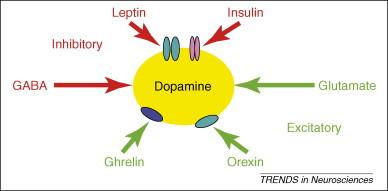
2. Motivation and happiness.
Recall that dopamine is one of the chemical factors of motivation, consolidating important for the survival and procreation of the action. Dopamine is involved in the formation and consolidation of conditioned reflexes with positive reinforcement and extinction when reinforcement is stopped. In other words, if our expectation of reward is justified, the brain tells us about this production of dopamine. If the award is not consequential decline in the level of dopamine signals that the model diverged from reality. In further works it was shown that the activity of dopamine neurons is well described by the model of learning automata: action, faster leading to the award, credited a great value. Enjoy the fun of all wants, and people are trying to raise the level of dopamine in different ways. In the mode of deficit speed of getting "high" becomes a decisive factor, while the long-term consequences of such behavior are not taken into account. Thus, drugs, illusion and the problem of the relationship becomes a kind of "surrogate happiness", "crutches".
3. The mental activity.
Dopamine plays an important role in providing cognitive activities. Activation of dopaminergic transmission is necessary when processes of switching of attention from one stage of cognitive activity to another. Thus, the failure of dopaminergic transmission leads to increased inactivity of the patient, which clinically manifested by slowness of cognitive processes. In suppressing the activity of dopamine neurons changes occur also in the cognitive sphere: decreases the speed of reaction becomes more difficult to learn and implement a new programme of action, reduced the level of attention, RAM. 4. Muscle tone and the desire to move.
In the extrapyramidal system, dopamine plays a role in stimulating neurotransmitter that promotes physical activity, reduction of motor inhibition and stiffness, reduction of muscle hypertonia.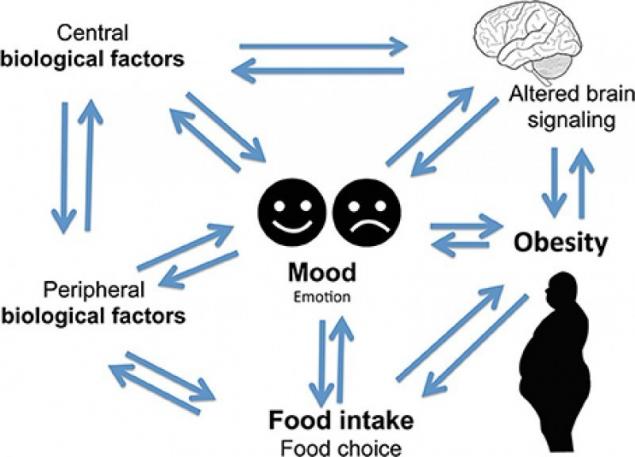
Conclusion.1. Leptin exerts much effect on dopamine levels in the brain. 2. For violation of leptin affects all dopamine function. The person loses motivation, there is muscle stiffness and weakness, always want to lie down, reduced mental activity and intelligence. 3. In the mode of deficiency the person becomes much more exposed to the risk of addictive behavior: drugs, overeating, porn, video games, casino, lottery, betting etc. 4. Reduced critical thinking (works worse prefrontal cortex), so such people often become a victim of fraud. 5. Much easier for a person in the mode of deficit to fall into the illusion and becomes a fanatic. Fanaticism allows you to raise dopamine levels is not worse than drugs. Excerpt from my article for onlayner:"In the mode of deficiency a person has difficulty with motivation and often feel anxiety, frustration, tension. Everything he does is dictated solely by the desire to avoid discomfort and to reduce the current level of stress. Man in the mode of deficit all the time I want to "cheer up" or "turn off", so he is inclined to fast food in all its forms: junk food, drugs (including alcohol, Smoking, excessive caffeine), fast food for the brain (surfing in social networks, TV, porn and news). In the mode of deficit long-term effects of actions do not matter, the main thing is to survive today, so there's always a conflict between "useful" and "want". In an attempt to escape from the discomfort, the person starts to run away from reality, he develops dependent behaviour. Escaping into drugs, illusions, troubled relationships, a person comes to the fact that these relationships are beginning to replace the common joys and pleasures of life. People in the mode of deficit often live among illusions about conspiracies, miracles, and the Prince on a white horse, they are far from reality and therefore often become victims of fraud and propaganda. Ultimately, they are nothing but illusions and dependencies, remains. Man wakes up with disgust, goes to work with hatred, unhappy with their looks, clothes, house, family, country, society. Having sobered up, the man runs for the bottle to relieve unbearable and painful pressure of reality." posted by Author Andrew Blueskin P. S. And remember, only by changing their consumption — together we change the world! © Join us at Facebook , Vkontakte, Odnoklassniki
Source: www.beloveshkin.com/2015/07/leptin-i-dofamin-psikhologiya-ehnergeticheskogo-statusa-chast-2.html
Currently, the connection between food (energy status and reward) is not in doubt. Deficient energy status (deficit) definitely enhances the craving for drugs and dependent behavior, overeating. At the same time, the deficit regime gives people less dependence on psychoactive substances.
If your body is in a deficit, you surely know its main manifestation: the sense of constant chronic fatigue and lack of strength. All your tests are normal, but you feel like dying. Yes, it is a mode of scarcity.
In the mode of deficiency occurs one important thing: you are dumb. Yes, you really are dumb, but this is, unfortunately, very difficult to notice yourself. Most often, on the contrary you will feel that you are smarter. In the first place under the regime of the deficit off the most energy-intensive organs: muscle, reproductive and immune system. And prefrontal cortex, which is responsible for your personality. Control passes to subcortical centers and the body begins to act very cost effective: simplifies everything and thinks contrasts. Or friend or foe. To drink or not to drink. There are no nuances and details. Yes it is easier, but adapting your suffering.

With a lack of leptin decreases the activity of dopaminergic neurons, plus increases the level of prolactin (risk of hypertension). It is established that satinovye signals from the lateral hypothalamic area (LHA) fall straight to the dopamine system ventral tegmental area (VTA). Introduction of leptin into this area suppresses appetite and causes weight loss.
Thus, latinova alarm system has a direct impact on the level of dopamine in the brain. Scientifically established that direct stimulation of hypothalamic leptin causes an increase of dopamine levels by 40% and increases the activity of gene transcription of dopamine to 2.5 times! The incredible rise!
Thus, leptin not only controls our eating behavior, but also a large part of the dopamine system that perfectly fits our theory of the deficiency and excess. Our diet greatly affects our emotional status and motivation. It is not the weight, it's in the normal work of the whole of our psyche, sense samodostatochnost and happiness in General! During normal operation, leptin much easier for us to resist all temptations, from food to dependencies of any kind.


Some aspects of the action of dopamine in the framework of the "energy status". 1. Our mood.
The level of mood associated with the level of leptin. The reason for the above relationships is the ability of leptin to inhibit depressive behavior by stimulating the secretion of brain-derived neurotrophic factor in the hippocampus, as well as to provide anxioliticeski effect by inhibition of dopaminergic neurons of the mid brain structures. Recall that dopamine is neiromediatorom in determining our drive, desire and motivation to do anything. It is also responsible for memory, attention, and our energy level. Dopamine largely determines our mood. In the mode of deficit, we strive to simply "survive". This means that we do not act actively, but simply reduce the level of discomfort and stress. Such a model is called a "reduction drive", it is typical for subcortical level of "animal". This model considers that the acts of motivated behavior (animals) aimed at decrease (reduction) of the state of the drive (desire, motivation). Assumes that behavior is determined by negative States of tension. In other words, the driving force of conduct is to avoid unpleasant.

2. Motivation and happiness.
Recall that dopamine is one of the chemical factors of motivation, consolidating important for the survival and procreation of the action. Dopamine is involved in the formation and consolidation of conditioned reflexes with positive reinforcement and extinction when reinforcement is stopped. In other words, if our expectation of reward is justified, the brain tells us about this production of dopamine. If the award is not consequential decline in the level of dopamine signals that the model diverged from reality. In further works it was shown that the activity of dopamine neurons is well described by the model of learning automata: action, faster leading to the award, credited a great value. Enjoy the fun of all wants, and people are trying to raise the level of dopamine in different ways. In the mode of deficit speed of getting "high" becomes a decisive factor, while the long-term consequences of such behavior are not taken into account. Thus, drugs, illusion and the problem of the relationship becomes a kind of "surrogate happiness", "crutches".
3. The mental activity.
Dopamine plays an important role in providing cognitive activities. Activation of dopaminergic transmission is necessary when processes of switching of attention from one stage of cognitive activity to another. Thus, the failure of dopaminergic transmission leads to increased inactivity of the patient, which clinically manifested by slowness of cognitive processes. In suppressing the activity of dopamine neurons changes occur also in the cognitive sphere: decreases the speed of reaction becomes more difficult to learn and implement a new programme of action, reduced the level of attention, RAM. 4. Muscle tone and the desire to move.
In the extrapyramidal system, dopamine plays a role in stimulating neurotransmitter that promotes physical activity, reduction of motor inhibition and stiffness, reduction of muscle hypertonia.

Conclusion.1. Leptin exerts much effect on dopamine levels in the brain. 2. For violation of leptin affects all dopamine function. The person loses motivation, there is muscle stiffness and weakness, always want to lie down, reduced mental activity and intelligence. 3. In the mode of deficiency the person becomes much more exposed to the risk of addictive behavior: drugs, overeating, porn, video games, casino, lottery, betting etc. 4. Reduced critical thinking (works worse prefrontal cortex), so such people often become a victim of fraud. 5. Much easier for a person in the mode of deficit to fall into the illusion and becomes a fanatic. Fanaticism allows you to raise dopamine levels is not worse than drugs. Excerpt from my article for onlayner:"In the mode of deficiency a person has difficulty with motivation and often feel anxiety, frustration, tension. Everything he does is dictated solely by the desire to avoid discomfort and to reduce the current level of stress. Man in the mode of deficit all the time I want to "cheer up" or "turn off", so he is inclined to fast food in all its forms: junk food, drugs (including alcohol, Smoking, excessive caffeine), fast food for the brain (surfing in social networks, TV, porn and news). In the mode of deficit long-term effects of actions do not matter, the main thing is to survive today, so there's always a conflict between "useful" and "want". In an attempt to escape from the discomfort, the person starts to run away from reality, he develops dependent behaviour. Escaping into drugs, illusions, troubled relationships, a person comes to the fact that these relationships are beginning to replace the common joys and pleasures of life. People in the mode of deficit often live among illusions about conspiracies, miracles, and the Prince on a white horse, they are far from reality and therefore often become victims of fraud and propaganda. Ultimately, they are nothing but illusions and dependencies, remains. Man wakes up with disgust, goes to work with hatred, unhappy with their looks, clothes, house, family, country, society. Having sobered up, the man runs for the bottle to relieve unbearable and painful pressure of reality." posted by Author Andrew Blueskin P. S. And remember, only by changing their consumption — together we change the world! © Join us at Facebook , Vkontakte, Odnoklassniki
Source: www.beloveshkin.com/2015/07/leptin-i-dofamin-psikhologiya-ehnergeticheskogo-statusa-chast-2.html
